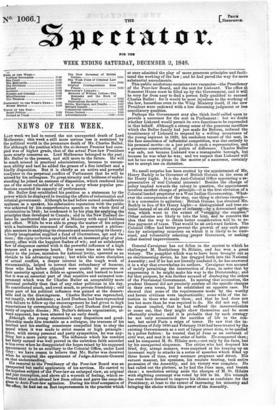NEWS OF THE WEEK.
LAST week we had to record the not unexpected death of Lord Melbourne ; this week a still more serious loss is sustained by the political world in the premature death of Mr. Charles Buller. For although the position which the ci-devant Premier had occu- pied was of higher grade, that of the actual Poor-law President more nearly concerns us. Lord Melbourne belonged to the past ; Mr. Buller to the present, and still more to the future. He will be much missed in practical administration, because to uncom- mon ability and tact he added the graces of a fine intellect and a kindly disposition. But it is chiefly as an active and powerful coadjutor in the perpetual conflict of Parliament that he will be missed by his colleagues. To great vivacity and boldness of under- standing he joined an easiness of disposition, which rendered him one of the most valuable of allies to a party whose popular pro- fessions exceeded its capacity of performance.
Mr. Buller first established his position as a statesman by the power which he displayed in treating the affairs of colonization and colonial government. Although he had before earned considerable applause as a speaker, his substantive reputation with the public was achieved by his comprehensive speech on the whole field of colonization in 1843 ; he confirmed it by his plan for applying the principles then developed to Canada; and in the New Zealand de- bates he confronted the power of a Ministry with equal boldness and effect. While he was able to grasp the matter of his subject with a businesslike command of details, he possessed a philoso- phic acumen in analyzing its elements and anatomizing its theory ; a lively imagination supplied a fund of illustrations, apt and va- rious ; the copia verborum sparkled with an incessant play of plea- santry, often with the happiest flashes of wit ; and an unlaboured flow of eloquence carried with it the powerful influence of a high purpose and a generous heart. For some time an undue ten- dency to the jocose, mistaken for habitual levity, operated as an obstacle to his advancing repute ; but while the stern discipline of actual conflict, a deeper interest in the tough work of statesmanship, helped to correct that redundancy of humour, those who had before objected were unable to persevere in their austerity against a foible so agreeable, and learned to know that it was an essential part of that sensitive and animated tem- perament which won for Charles Buller an acceptability more universal probably than that of any other politician in his day. Ile contributed much, and owed much, to private friendship ; and great part of his political influence was gained at the dessert- table and in the drawingroom. Charles Buller was reproached, not inaptly, with indolence; as Lord Durham had been reproached with failure to follow up the encouragement he had given to high expectations by corresponding deeds: Lord Durham died prema- turely of organic disease ; Mr. Buller's delicate organization, al- ways apparent, has been attested by an early death. Although the young statesman's easy disposition and good- fellowship made him tractable as a colleague, the trueness of his intellect and his sterling conscience compelled him to obey the appeal when it was made to strict reason or high principle : hence, with strong personal and party sympathies he was any- thing but a mere party man. The influence which his conduct had fairly earned was well proved in the unbroken faith accorded to him even when he disappointed the hopes raised by his supposed appointment to be an auxiliary to the Colonial Office, under Lord Grey : we have reason to believe that Mr. Buller was deceived when he accepted the appointment of Judge-Advocate-General on that understanding. His removal to the Presidency of the Poor-law Board was an unexpected but useful application of his services. He carried to the hopeless subject of the Poor-law an enlarged view, an original and just conception, and above all a warmth of feeling, which re- deemed that much-abused law from odium and gave the coup-de- grace to Anti-Poor-law agitation. During his brief occupation of tile office, he had set on foot improvements in the practice which
at once admitted the play of more generous principles and facili- tated the working of the law ; and he had paved the way for more substantial amendments.
This public misfortune occasions two vacancies—the Presidency of the Poor-law Board, and the seat for Liskeard. The office at Somerset House must be filled up by the Government, and it will be very far from easy to find a person fully qualified to succeed Charles Buller : for it would be most injurious to the working of the law, hazardous even to the Whig Ministry itself, if the new President were endowed with a less discerning judgment or leas conciliatory qualities.
Perhaps the Government may also think itself called upon to provide a successor for the seat in Parliament : but we doubt whether Liskeard would permit its own functions to be superseded in that behalf. Although a strong sense of the generous sacrifices which the Buller family had just made for Reform, induced the constituency of Liskeard to respond by a willing acceptance of the young aspirant in 1832, his unshaken tenure of the seat, in the face sometimes of influential competition, was due entirely to his personal merits—to a just pride in such a representative, and a generous construction of points of difference. Charles Buller was safe, not because Liskeard was a manageable borough, but because he was what he was; and we suspect that Liskeard will not be too easy to please in the matter of a successor, certainly not to accept one on dictation.


























